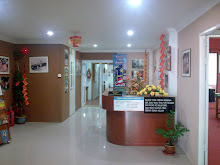How many more will be elected unopposed today? Since 1969, only 27 candidates have made it to the ‘exclusive club’
THERE is a club that all aspiring elected representatives dream of joining but only a handful have gained entry out of the hundreds of candidates who saw action in parliamentary elections in the state.
To become a member of this club, there is only one requirement — win unopposed.
In the nine parliamentary elections in Sarawak since 1969, only 27 candidates had enjoyed the comforts of the club while others battled away.
Today is nomination day again and chances are good that there would be new members who will join the club.
The question is how many? More than the six in the 2004 parliamentary election perhaps?
To win uncontested on nomination day is to have a massive load taken off a candidate’s shoulders.
With his place assured in parliament, he keeps his dates on the campaign trail but mainly to thank his constituents.
And if he is a party candidate, he goes where he is needed to shore up support for the contending candidates from his party.
A candidate who has won uncontested may have won his battle but not his party’s war.
The first parliamentary election to have uncontested victories in Sarawak was in 1978 with Datuk Amar Stephen Yong in Padawan, Datuk Luhat Wan in Baram and Racha Umong in Bukit Mas.
Since then, there have been uncontested victories every time the parliamentary polls were held.
The year 1995 was a bumper year for candidates who won uncontested when eight in total were ushered into the club.
That year, the candidates who won unopposed were three times Datuk Amar Dr Sulaiman Daud (Petra Jaya), Pehin Sri Abdul Taib Mahmud (Kota Samarahan), Datuk Wan Junaidi Tuanku Jaafar (Batang Lupar), Jawah Gerang (Lubok Antu), Datuk Douglas Uggah Embas (Betong), Datuk Abang Abu Bakar Abang Mustapha (Kuala Rajang), Tan Sri Law Hieng Ding (Sarikei) and Datuk Dr Leo Michael Toyad (Mukah).
The two elections with the second highest number of unopposed candidates were in 1982 and in 2004 with six candidates each.
In the last parliamentary election, the unopposed victors were Taib (Kota Samarahan), Datuk Rohani Abdul Karim (Batang Lupar), Datuk Wahab Dolah (Kuala Rajang), Alexander Nanta Linggi (Kapit), Datuk Peter Chin (Miri) and Henry Sum Agong (Bukit Mas).
Taib, the Chief Minister and the state Barisan Nasional (BN) chairman, and Dr Sulaiman are the only two parliamentarians to have won unopposed three times in Sarawak.
Taib won uncontested in 1982, 1995 and 2004, while Dr Sulaiman experienced it in 1982, 1986 and 1995.
What makes the club even more exclusive must be that all who have passed through its gates are from the BN and a majority of them are from the state coalition’s backbone, Parti Pesaka Bumiputera Bersatu (PBB), of which Taib is president.
But candidates who win uncontested are not without their critics.
“It’s a win by default. In sports term, a walk-over. They haven’t proven that they have the support of the people,” said a critic.
However, in a country that practises democracy, that is a little hard to swallow and luck has nothing do with it too.
The fact that many of those who win unopposed are political heavyweights and that some of them can win without breaking a sweat in more than one election must mean something.
Surely, their performance and popularity among constituents as well as the political situation of the day would have played on the minds of their opponents as they decided right up to the time the nomination centres opened whether or not they should join the race.
So maybe when a candidate wins uncontested, his opponents had come to the conclusion that their cause might not be worth the trouble and that they would rather not lose time or money — there’s a lot one can do with an election deposit of RM10,000.
After 11am today, the contenders in all 31 parliamentary seats in Sarawak should be known but how many will go on to join the club of unopposed winners is still anybody’s guess.
Some political observers reckoned that there could be more uncontested wins this election.
“My feeling is that because the election is held in a little of a hurry, some parties may be unprepared and I doubt if the independent candidates have enough time to search for funding,” said a senior politician.
He believed that while it was almost certain that all urban seats would be contested, there would be some rural seats that could go unopposed to the BN.
When told that land seemed to be an issue in the urban areas, he replied: “Land will be a minor political issue. By and large, I think it would go quite smoothly for BN. I think there could be more uncontested seats.” Another politician, however, disagreed as he believed that there were enough prevailing issues now to encourage people to make their stand during the polls.
On top of that, he expected the opposition parties to contest in more seats, even fighting each other in some seats.
All opposition parties in Sarawak, including the Sarawak National Party (SNAP) and the State Reform Party (STAR), are expected to contest in the coming election.
“I won’t be surprised if there is no uncontested win this election with the exception of maybe one or two seats. A lot has happened since the 2004 election in the state and country as a whole,” he said.
Baring any slip-ups by the BN candidates that could disqualify them from the race today, it is very unlikely that the opposition members will ever get to throw their feet up in the exclusive club of unopposed victors.
The possibility is even more remote if they are independent candidates, who are permanent fixtures in every parliamentary election.
A total of 163 independent candidates have entered the fray since 1969. And if the club for the unopposed is exclusive, the club for successful independent candidates would be even harder to enter though not as many politicians dream of joining them.
Only 10 independent candidates have won in parliamentary elections in Sarawak.
Unting Umang was the first independent candidate to win in Sarawak and he did it in a seven-cornered fight in Kanowit in the state’s first parliamentary election in 1969.
A total of 23 independent candidates were contesting in that election.
Garnering 2,030 votes, Unting won with a slim margin of 488 votes over his closest rival, Sarawak United People’s Party’s (SUPP) Chua Kai Siong.
After Unting, however, independent candidates had to wait until 1982 for a breakthrough.
In the 1982, election three independent candidates won, followed by two in 1986 and four in 1990. There has not been any successful independent candidate in Sarawak after 1990. The year 1986 also saw the biggest number of them in the fray at 28.
In the 2004 election, there were 10 independent candidates. Some of the names of the successful independent candidates might be familiar: Patrick Uren, Edwin Tangkon and Edmund Langgu in 1982, Linus Andrew Luwak and Nicholas Munong Ibau in 1986, and Richard Riot, Joseph Mauh, Billy Abit Joo and Harrison Ngau Laing in 1990.
Many of them eventually joined the Barisan Nasional (BN) and two of them will be defending their seats again in the coming election.
They are Riot in Serian and Abit in Hulu Rajang.A former independent candidate who is now a BN leader said the number of independents contesting in an election is closely related to the political situation of the day.
Party conflicts or political upheavals, he said, would often cause more independents to contest.
He said in 1986, there were a huge number of independent candidates because of the ‘Maju Group’, a group of disgruntled former coalition party members, and in the following election where 25 independents contested, the defunct Parti Bansa Dayak Sarawak (PBDS) was a factor.
However, he said the scenario has changed today and he did not expect to see as many independent candidates.
Nevertheless, he agreed that problems in Parti Rakyat Sarawak and SUPP could cause some independents to stand.
“Most votes cast for independent candidates are protest votes. Some of them stand not hoping to win but just to send a signal or a message to the government,” he said.
He also believed that the increased election deposit from RM5,000 to RM10,000 from the 1999 parliamentary election onwards would deter people from standing as independents.
A candidate will lose his election deposit if he cannot garner more than 12.5 percent of the total votes cast.
Similarly, he agreed that the strategy of planting independent candidates to split votes in difficult constituencies was fading away.
“It’s just too expensive now and it’s not a very good strategy anyway,” he said.
Sunday, February 24, 2008
Subscribe to:
Post Comments (Atom)



.jpg)

No comments:
Post a Comment